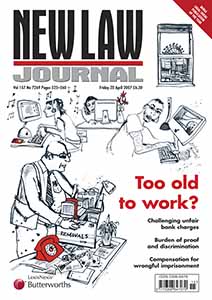
Nicholas Bevan considers the treatment of personal injury claims in the final article of the 44th update to the CPR
R v DPP [2007] All ER (D) 50 (Mar)
How do the rules relating to mitigation of loss apply to leases? Sebastian Kokelaar explains
Nova Productions Ltd v Mazooma Games Ltd [2007] EWCA Civ 219, [2007] All ER (D) 234 (Mar)
Ordinary claims, Defamation claims, Group litigation, Public interest challenges
McKinnon v Government of the USA and another, Hurstanger Ltd v Wilson and another
Criminal Justice Act 2003 - Dangerous and confused? Bad character - identification issues and harsh words, Drink, guns and mobile phones, Pre-charge bail powers
The insolence of some lawyers leaves the Insider aghast
The Iran hostage debacle has punctured the image of our service personnel, says Elliot Gold
MOVERS & SHAKERS

Freeths—Ruth Clare
National real estate team bolstered by partner hire in Manchester

Farrer & Co—Claire Gordon
Partner appointed head of family team

mfg Solicitors—Neil Harrison
Firm strengthens agriculture and rural affairs team with partner return







